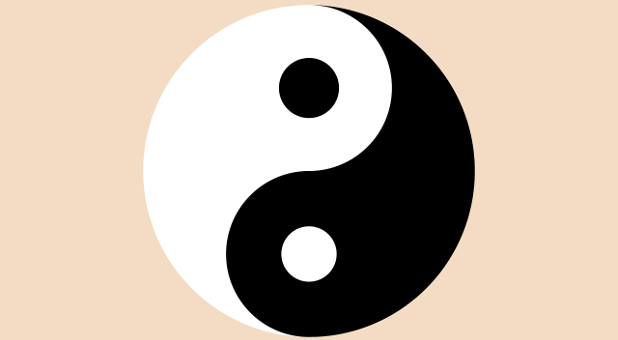This world is full of opposites: weakness and strength, pain and pleasure, depression and joy, winter and summer, cold and heat, passive and active, female and male, valleys and mountains, evil and good, darkness and light, earth and heaven, death and life—and the list goes on and on and on. It’s the nature of this universe in which we live: something called duality.
Recognizing these inescapable, opposite attributes of earthly existence, then balancing and harmonizing them, is a fundamental principle in Taoism, the ancient religion of China. It is emphasized to such a degree that the yin-yang symbol is recognized as the primary icon of that religion.
The words “yin” and “yang” literally mean the dark side and sunny side of the hill.
But visually, they are represented by two “water-droplet” parts that fit together like puzzle pieces—one dark, the other light. Fused together, they become a complete circle, because we cannot have one without the other.
Also, within the black droplet is a white dot; within the white droplet is a black dot. Why? Because in every evil person there is an element of good and in every good person there is an element of evil. In every bad circumstance, there can be something good that results and in every good circumstance there can be something bad that results.
So far, all this sounds correct—an idea that is universally acceptable, a fundamental truth that we can all agree on regardless of the belief system we embrace. So, where does this concept go wrong? You may be quite surprised.
In this Revealing the True Light podcast, Mike Shreve explains the major doctrinal errors and anti-biblical ideas this emblem portrays, especially concerning the origin of evil, the nature of man and the character of God. You need this insight. {eoa}
Mike Shreve has been teaching God’s Word since 1971, with an emphasis on healing and the prophetic. He has authored 15 books, including the bestselling 65 Promises From God for Your Child. Discover Your Spiritual Identity podcasts are based on Mike Shreve’s book Who Am I. Obtain your copy today. Visit shreveministries.org, facebook.com/shrevemin, twitter.com/shrevemin and instagram.com/mike_shreve.
Subscribe to Mike Shreve’s other CPN podcast called Discover Your Spiritual Identity.








































